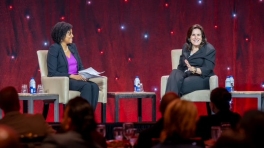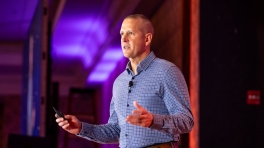The One Big Beautiful Bill's 1% floor represents a fundamental shift in how the United States approaches corporate charitable tax incentives. While it will generate more government revenue, it comes at the cost of reduced support for nonprofit organizations at a time when the government safety nets for vulnerable communities and services are also being cut.
Read MoreStewart Rassier
Director of Executive EducationStewart is the Director of Executive Education at the Center, he has more than 11 years of sustainability education, communications, and advisory experience working with leading companies across the globe. Stewart has designed and implemented workshops, sustainability strategies, policies, programs, and performance management systems that connect sustainability to the business, reduce cost, engage stakeholders, and produce impact. Prior to the Center, Stewart was the Regional Head of North America at AccountAbility, a Sustainability advisory, research, and standards organization, and was a Director at Saatchi Sustainability, a sustainability strategy consultancy within the global communications firm. Stewart is a graduate of the University of St. Andrews, Scotland, where he received both his bachelor's and master's degree in international relations and social anthropology.
Recent Posts by Author
At the 2025 International Corporate Citizenship Conference in National Harbor, MD, BCCCC announced the winners and runners up of this year's Innovation Awards, sponsored by Travelers. Check out the winning companies...
Read MoreThoughtful insights from BCCCC Executive Director, Katherine Valvoda Smith, on the parallels between Apollo 13's crisis management playbook and current DEI leadership challenges, including how business leaders can adapt their "flight plans."
Read MoreThe first days of the new administration have yielded a plethora of executive orders... These may signal policy priorities and influence broader corporate behavior through indirect effects on regulations, enforcement priorities, and market conditions.
Read MoreHow are companies responding to the devastating wildfires impacting California communities and local employees?
Read MoreHow are companies responding to Hurricanes Milton and Helene? This roundup offers examples and strategies for corporate giving professionals and foundation directors looking to borrow on best practices.
Read MoreIf your company is committed to tackling food insecurity in the U.S. or abroad, the following information and program examples may prove helpful. Continue reading for a primer on drivers of food insecurity and its disparities. Or skip ahead to read how companies like Toast, Deli Star, and Machias Savings Bank are developing innovative, multi-faceted solutions to combat hunger—today and tomorrow.
Read MoreA look at community resilience through the lens of disaster resilience. What does this facet of resilience look like? How is it relevant to corporate community involvement/social impact teams? And what can companies be doing to bolster disaster resilience in a world of ever-evolving threats?
Read MoreNearly one-quarter of U.S. adults now split their time between full-time work and at-home caregiving responsibilities, effectively "pulling double duty." Why is it so important that companies look for ways to support these parents, grandparents, and caregivers? This post outlines the whys, hows, and examples of employer support for working parents/caregivers.
Read MoreApril is Financial Literacy Month—the perfect time to profile BCCCC member companies who are working to support financial literacy and financial wellness among their stakeholders. What can your company learn from these examples?
Read MoreCorporate citizens from BCCCC’s advisory boards acted as judges in evaluating dozens of competitive submissions from companies around the world. They reviewed each submission for its program design and creativity, tangible outcomes, disruption potential, and overall corporate citizenship.
Read MoreAaaaaaaand, that's a wrap! As we close the books on Memphis and look ahead to #BCConf25 in National Harbor, here's a look at all the incredible content Day Three provided.
Read MoreOn Day Two of #BCConf, attendees heard from FedEx and Travelers, alongside their corporate social responsibility partners. They also enjoyed a variety of breakout sessions, case studies, and workshops.
Read MoreThe afternoon of Day Two at #BCConf brought more opportunities for CSR professionals to customize their conference experience. Attendees also heard from Bank of America and partners, followed by the president of the National Civil Rights Museum.
Read MoreIf you couldn't make it to Memphis, or if you want to follow along from the event, here's a quick recap of what happened on Day One of the 2024 International Corporate Citizenship Conference, including this year's Innovation Award winners...
Read MoreWhat is skills-based volunteering (SBV)? How does it differ from pro bono services? This post offers company examples, SBV benefits, tips on measuring impact, tools for managing SBV programs, and much more...
Read MoreThe SEC just approved a final rule on corporate climate disclosure that companies have been anticipating for several years. This post offers a breakdown of what’s involved, who it affects, and how this new requirement fits into the ever-evolving context of ESG reporting regulations in the U.S. and abroad.
Read MoreMentoring in the workplace is becoming an increasingly popular tool for attracting and retaining top talent, including diverse talent and the next generation of workers. Read this overview of mentoring program models, best practices, benefits to the different parties involved, and ideas for measuring impact.
Read MoreA roundup of community involvement initiatives from companies large and small. Plus some news on open roles, promotions, and professional development opportunities happening in the world of corporate social responsibility.
Read MoreA roundup of corporate responses, company and CEO statements regarding the Hamas attacks on Israel in October 2023. This list will be updated.
Read More



















